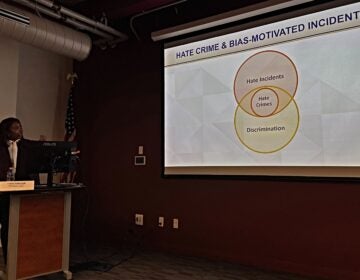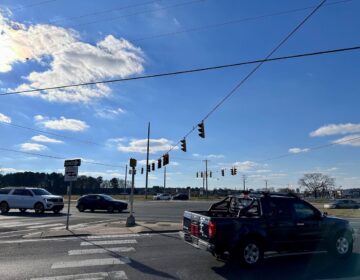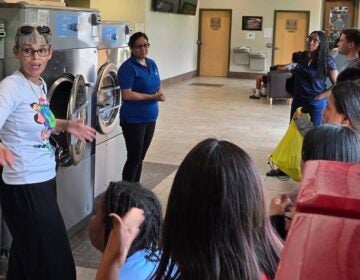From a bloody past to a troubled present, Delaware’s Guatemalans seek a brighter future with new President Bernardo Arévalo
Guatemalans in Newark and Georgetown are hopeful for positive change back home with the election of a new leader.
Listen 1:30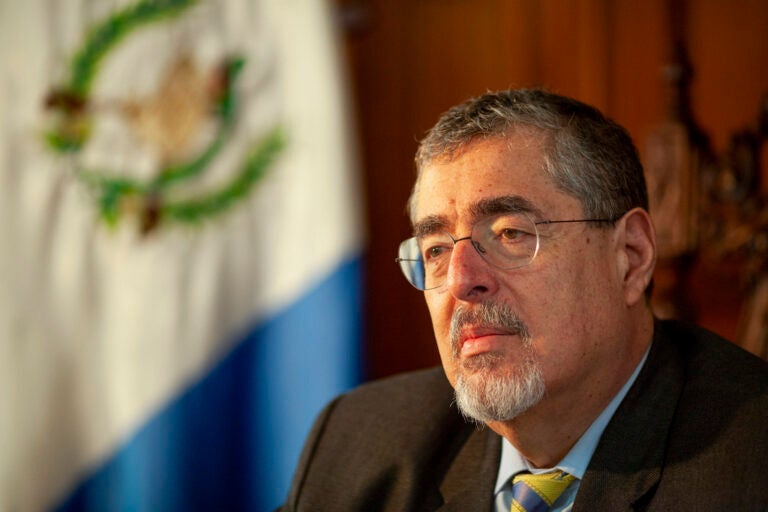
Guatemalan President Bernardo Arévalo gives an interview at his office in the National Palace in Guatemala City, Thursday, Feb. 1, 2024. (AP Photo/Sandra Sebastian)
From Philly and the Pa. suburbs to South Jersey and Delaware, what would you like WHYY News to cover? Let us know!
Thousands have fled Guatemala over the past 60 years, hoping to escape a civil war that lasted from 1960 to 1996. The following years saw rising violence, civil unrest and pervasive poverty.
Over the course of the 36-year-long war, more than 200,000 Guatemalans were killed or disappeared. Indigenous Maya made up 83% of that number of casualties. The U.S.-backed Guatemalan army’s destruction of more than 600 villages further deepens the scars of the country’s history.
Many of those who fled the violence ended up in Delaware. Guatemalans make up the second-largest segment of Latino residents in the state.
Last month, Guatemala’s new President Bernardo Arévalo took office, after promising to battle corruption. With new leadership, what do Delaware’s Guatemalan residents hope for from the new administration?
Aracely Garcia Ramirez is one of those who escaped to the U.S., eventually landing in Newark, Delaware, after leaving Ixchiguán in the San Marcos section of Guatemala near the Mexican border 24 years ago.
She remembers what it was like when the war was raging. She was just 3 years old when she heard soldiers knock at their door and children crying. She saw people running, homes being demolished and even burned.
“Por lo poquito que yo me acuerdo, las personas no podían dormirse en su casa, se tuvieron que quedarse en las noches en el monte y todos tenían miedo porque estaban amenazados de que los ejércitos iban a llegar a quemar sus casa”, ella dijo. “Por ejemplo, la casa de mis padres, la quemaron y la quemaron la casa de mi abuela y pues en ese tiempo, pues yo perdí a mi padre en la guerra, perdimos a muchos familiares”.
“Algo que no se me olvida fue de que cuando llegaron a sacar a uno de mis tíos de la casa, de la cama y enfrente de nosotros lo asesinaron”, ella añadió.
“From the little bit that I remember, people could not sleep in their houses, they had to stay in the hills during the nighttime and everyone was afraid because they were threatened that the army was going to come and burn their houses,” she said. “For example, they burned my parents’ house and my grandmother’s house and, well, at that time, I lost my father in the war, we lost many relatives.”
“Something that I haven’t forgotten was when they came to take one of my uncles out of the house, out of bed, and in front of us, they murdered him,” she added.
When she was 10, Garcia had to end her education at the elementary school level when she moved to the nation’s capital, Guatemala City, for “better opportunities.”
“Por ejemplo, en mi pueblo allá no hay trabajo más que en el campo… Mi pueblo era un pueblo abandonado porque no había buenas carreteras, no había buenas escuelas, no teníamos el apoyo del gobierno”, ella dijo. “En mi pueblo hay una, hay un grupo de personas que se dedican a recaudar dinero para arreglar las escuelas, para arreglar las carreteras, todo lo que necesita el pueblo”.
“For example, in my town, there are no jobs except in agriculture… My town was an abandoned town; there were no good roads, there were no good schools, we did not have the support of the government,” she said. “In my town, there is a group of people who are dedicated to raising money to fix the schools, to fix the roads, everything the town needs.”
Yet, even with the improved job prospects, transportation, and structure in the city, it still fell short of providing a good quality of life. That prompted her decision to migrate to the U.S., mirroring the widespread trend of mass migration out of Guatemala.
Looking back at the corruption and lack of support from the Guatemalan government, Garcia emphasizes the resilience of her community. While acknowledging the challenges, she believes that if the new president supports their dreams and the community’s hard work, there is potential for economic benefits, reducing the need for migration to the US.
“No recibimos apoyo del estado, del país. Como te vuelvo a decir, se ha superado ese pueblo, pero por la gente que ha trabajado fuertemente aquí en Estados Unidos”, Garcia añadió.
“We do not receive support from the state, from the country. As I tell you again, that town has survived, but because of the people who have worked hard here in the United States,” Garcia added.
U.S. Sen. Tom Carper of Delaware has made multiple trips to see what’s happening in Guatemala and the neighboring countries of Honduras and El Salvador, especially as more migrants from those countries have arrived at the U.S. border.
“The reason why folks from Honduras, Guatemala, El Salvador, a bunch of other countries down there, come to our country illegally is because they leave, in many cases, lives of misery, a lot of crimes, a lack of education, a lack of opportunity and in some cases, just the climate change drought, which is really killing the ability to be successful farmers, including raising coffee,” Carper told WHYY News last year.
Guatemala, like many other countries in the region, is missing the rule of law, he said.
“One of the biggest problems they have in that part of the world is rule of law, the main thing is rule of law and establishing or reestablishing the rule of law. [There’s] a lack of enforcement of law, second, there’s a lot of kids that may not go to school beyond the third, fourth or fifth grade,” he said. “There’s a great need for development work and infrastructure roads, highways, bridges.”
‘La gente no va a tener la necesidad de emigrar’
Despite a legal effort to invalidate the election results, the Guatemalan people, led by Indigenous leaders and organizers, initiated a push for change through months-long protests calling on the government to honor the democratic process and the election results declaring Arévalo the winner. Officials seeking to invalidate Arévalo’s win faced international pressure as well, and Arévalo was ultimately inaugurated on Jan. 15, following a nine-hour delay due to opposition from some lawmakers.
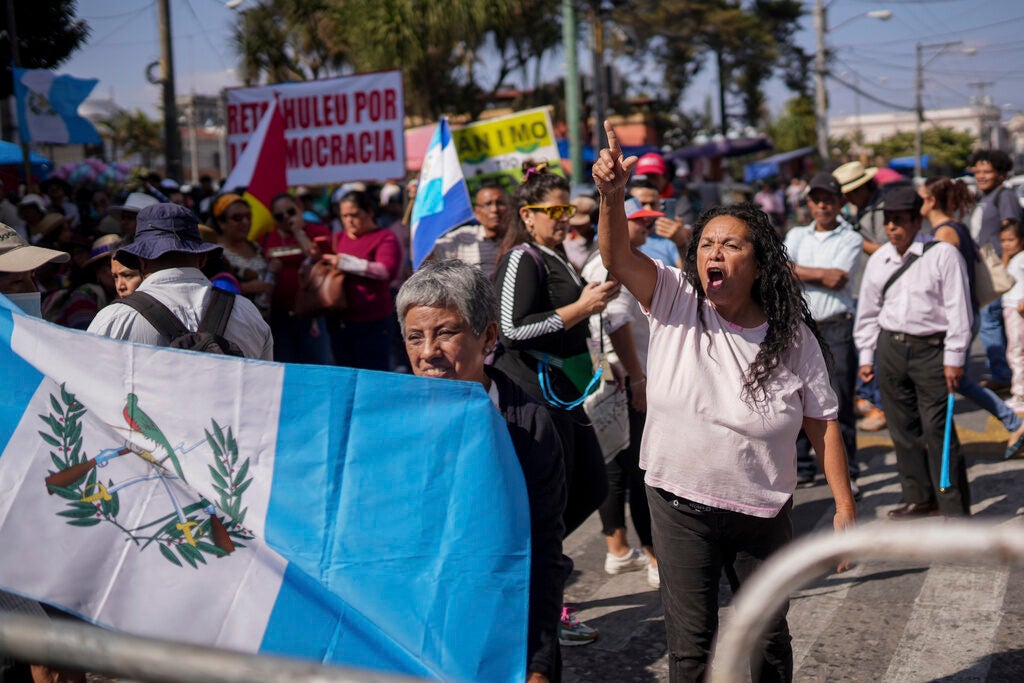
Arévalo’s presidential objectives include repaying the historic debt to Indigenous Maya communities, expanding healthcare and education access, fostering national development and proactively addressing the challenges of climate change.
“What people in the region want is transformation, change in their livelihoods, they need political systems that respond and address their needs,” Arévalo said during a PBS Newshour interview last year. “We need democratic institutions to be able to address those needs.”
Many Guatemalans are hopeful for transformation under Arévalo.
“Si él cumple sus sueños estaría bien para la comunidad, para la gente y la gente se va a beneficiar económicamente”, Garcia dijo. “Si el presidente los va a apoyar, la gente no va a tener la necesidad de emigrar a Estados Unidos. Porque esa es la razón por la que la gente emigra para otro país porque no tienen la oportunidad”.
“If he fulfills his dreams, it would be good for the community, for the people and the people will benefit economically,” Garcia said. “If the president is going to support them, people will not have the need to emigrate to the United States. Because that is the reason why people emigrate to another country because they do not have opportunity.”
Kenny Eduardo Ozuna arrived in Georgetown, Delaware, a few months ago with the intent of reuniting with his family. The 24-year-old came to the U.S. to find refuge from the pervasive poverty and violence he deemed commonplace in Guatemala City.
When he was young, Ozuna was accidentally shot by a gang member who had intended to target someone else. With the arrival of this new president, he has hope for increased security across the board.
“Poner bastante seguridad en Guatemala, creo que eso ayudaría bastante. Ya no hubiera tanta extorsión, la gente ya podría tener más trabajo. Sobre la seguridad creo que cada quien ya saliera con su puesto”, dijo. “Pues la segunda creo que sería pues ayudar bastante a la educación en todo el país”.
“Putting enough security in Guatemala, I think that would help a lot. There wouldn’t be so much extortion, people could have more work. With security, I think that everyone would have their own business,” he said. “The second, I think, would be to help education throughout the country.”
If their home country improves, both Guatemalans in Delaware would consider returning, be it for visits or permanent stays. Their common sentiment is hope that the new president doesn’t disappoint the Guatemalans and remains committed to the “transformative” promises Arévalo has articulated.
The next four years could be a period of significant transformation for the country, but only time will tell.
“We want to transform the lives of Guatemalans for the better, so yes, we believe and we are going to be a transformative force in Guatemala,” Arévalo told Newshour in an interview. “I think that in Guatemala, we have an opportunity to build such a vision and this is going to be beneficial to all the countries in the region as well.”

Get daily updates from WHYY News!
WHYY is your source for fact-based, in-depth journalism and information. As a nonprofit organization, we rely on financial support from readers like you. Please give today.



